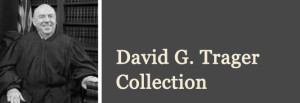This week Prof. Fajans and Librarian Kathy Darvil will hold their semi-annual workshop on how to research and write a seminar paper. Topics covered included sources for selecting your topic, sources for researching your topic, and how to effectively organize and write your paper. The workshop will be held in Room 401 on Wednesday, September 16th from 4:00-5:30 PM.
If you are unable to attend the workshop, you can access an online research guide which contains a recording of the workshop, links to and descriptions of all the research sources discussed, and the writing and research presentations. The online guide is available at guides.brooklaw.edu/seminarpaper. From the guide’s landing page, you will be able to access a recording of this year’s presentation, Professor Fajans’ slideshow on how to write your seminar paper, and Kathy Darvil’s online presentation on how to research your seminar paper. If you should need further help selecting or researching your topic, please stop by the reference desk for assistance.
Author Archives: Kathy Darvil
NYC Charter Revision Commission Materials Available on BrooklynWorks
 Recently, the Library completed a digitization project of the papers of Brooklyn Law School’s former dean, the Honorable David. G. Trager. The documents published relate to Judge Trager’s work on two successive New York City Charter Revision Commissions: December 1986-Novemer 1988 and December 1988-November 1989. The digitized documents were selected from materials he donated to the Brooklyn Law School Archives. To access the entire collection, you can contact the reference desk (refdesk@brooklaw.edu) and make an appointment to visit the archives.
Recently, the Library completed a digitization project of the papers of Brooklyn Law School’s former dean, the Honorable David. G. Trager. The documents published relate to Judge Trager’s work on two successive New York City Charter Revision Commissions: December 1986-Novemer 1988 and December 1988-November 1989. The digitized documents were selected from materials he donated to the Brooklyn Law School Archives. To access the entire collection, you can contact the reference desk (refdesk@brooklaw.edu) and make an appointment to visit the archives.
Judge Trager was born in Mount Vernon, New York and graduated from Columbia University in 1959 and Harvard Law School in 1962. After four years in private practice, he dedicated his life to public service, fulfilling many roles, including law clerk, federal prosecutor, teacher, state investigation commissioner, administrator, and jurist. From 1974 – 1978, he served as United States Attorney for the Eastern District of New York. Afterward, he began a fifteen-year tenure at Brooklyn Law School, first serving as Professor of Law (1978 – 1983) and then as its Dean (1983 – 1993). In 1993, President Bill Clinton appointed him to the United States District Court for the Eastern District of New York. He attained senior status on March 1, 2006. Judge Trager passed away on January 5, 2011 at the age of 73.
Being in the Know
While working at your summer job or internship, it is important to stay up to date on legal developments and current events. One way to do this is to monitor legal news by using an RSS feed. If you have never set up an RSS feed, watch this easy to follow video demonstrating how to do so. https://www.youtube.com/watch?v=0klgLsSxGsU (Note: this video refers to Google Reader, which is no longer in service.)
As the video describes, you need to complete two steps to create an RSS feed. First, you need to sign on to a reader, which is a website where you view the latest news from your favorite sources. The second step is to set up a connection between your reader and your favorite legal news providers. You do this by subscribing to legal news sites or legal blogs.
Listed below are a few free RSS readers, and a few popular and reliable legal news sources.
RSS Readers
Feedly (Web/iOS/Andriod): Great looking design and easy to use interface.
Reedah (Web): Simple minimalist design. Good feed for beginners.
Comma Feed (Web): Designed to be superfast
FeedBooster (Web): Site is ad-free and can sort feeds in multiple ways
Legal News Providers
Law360: Very current coverage of law. Browse news by practice area or jurisdiction. Need to implement proxy instructions for off-campus access.
New York Law Journal: Covers New York legal developments. It is the go to source for attorneys practicing in New York. Browse news by practice area. Also publishes decisions from New York State and Federal Courts. Need username and password to access some articles. Contact refdesk@brooklaw.edu for credentials.
Jurist Law: Free source supported by the University of Pittsburgh, School of Law. Very current, real time coverage or U.S. and World Legal News.
BNA Law Reports: Available via Bloomberg Law. BNA publishes law reports on over a 100 different legal topics. To access BNA Law Reports, sign on to Bloomberg Law and select BNA Law Reports from the “Getting Started” menu on the home page.
Exam Time Success
 This time of year can be quite overwhelming. But it doesn’t have to be. There are many resources in the library to help you succeed. Listed below are some of the resources. If you have questions about them, please feel free to stop by or email (refdesk@brooklaw.edu) the reference desk.
This time of year can be quite overwhelming. But it doesn’t have to be. There are many resources in the library to help you succeed. Listed below are some of the resources. If you have questions about them, please feel free to stop by or email (refdesk@brooklaw.edu) the reference desk.
Study Aids:
Site provides links to popular study aids for first year courses.
There are a few ways to identify study aids for upper level courses. One way is to search the SARA catalog for the subject matter of the exam and then use the filters on the left to limit the list to items located on Reserve. Another way is to search for a particular series. For example, you could search SARA for West’s Nutshell Series, the Understanding Series, Sum and Substance, Concise Hornbook Series, or Examples and Explanations.
Legal Writing and Citation Tools:
Site links you to resources to help with legal writing and analysis.
Site links you to legal citation resources
Other Tools for Success:
Link provides access to past exams
Legal Research Beyond Westlaw & Lexis
 While in law school, you may find the vast majority of the sources you need through the two main online legal platforms, Westlaw and Lexis. There is a reason why they are the leaders of the pack. They provide you with a comprehensive set of primary and secondary sources of law. But Westlaw and Lexis do not necessarily have every resource you may need. Listed below are three other key legal online platforms with a brief description of each platform’s unique content. Before you graduate, make sure to utilize and become familiar with these tools. If you have any questions about accessing or using them, please contact a reference librarian. (refdesk@brooklaw.edu)
While in law school, you may find the vast majority of the sources you need through the two main online legal platforms, Westlaw and Lexis. There is a reason why they are the leaders of the pack. They provide you with a comprehensive set of primary and secondary sources of law. But Westlaw and Lexis do not necessarily have every resource you may need. Listed below are three other key legal online platforms with a brief description of each platform’s unique content. Before you graduate, make sure to utilize and become familiar with these tools. If you have any questions about accessing or using them, please contact a reference librarian. (refdesk@brooklaw.edu)
For legal news, Bloomberg BNA Law Reports are the industry standard. There are over 100 different law reports, which cover a range of topics including: securities, patent, trademark, copyright, white collar, health care, environmental law, labor and employment, etc. Besides BNA Law Reports, Bloomberg BNA provides access to Bloomberg News which monitors the latest legal, regulatory, and industry developments. One of my favorite features of Bloomberg BNA is the dockets database. Only Bloomberg BNA searches both the text of the docket sheets as well as the retrieved underlying court documents. The dockets database is a great way to monitor litigation of interest and to identify sample court documents.
CCH is a platform that focuses on highly regulated areas of law. The database contains related cases, statutes, agency regulations, agency decisions, agency handbooks and guidance documents, editorial commentary, and legal news. Areas of law covered include securities, banking, antitrust and trade, corporate governance, products liability, secured transactions, and tax. If you end up practicing in one of these areas, this is a key platform for research and keeping current on the law.
Heinonine has cornered the market for legal history platforms. Compared with Lexis and Westlaw, whose coverage for many sources begins in the late 80s or early 90s, Heinonline contains volumes which often date back to the publications’ inception. For example, Heinonline contains every volume of the Congressional Record, the entire Federal Register and Code of Federal Regulations, volumes of the United States Reports that date back to 1754, as well as classic legal treatises from the 16th to 20th century. Unlike Westlaw and Lexis, Heinonline also carries the complete run of law review and law journals.
Writing a paper this semester?
 This week Prof. Fajans and Librarian Kathy Darvil held their semi-annual workshop on how to research and write a seminar paper. Topics discussed include sources for selecting your topic, sources for researching your topic, and how to effectively organize and write your paper. If you were unable to attend the workshop, you can access an online research guide which contains a recording of the workshop, links to and descriptions of all the research sources, and the writing and research presentations. The online guide is available at guides.brooklaw.edu/seminarpaper. From the guide’s landing page, you will be able to access a recording of this year’s presentation, Professor Fajans’ slideshow on how to write your seminar paper, and Kathy Darvil’s online presentation on how to research your seminar paper. If you should need further help selecting or researching your topic, please stop by the reference desk for assistance.
This week Prof. Fajans and Librarian Kathy Darvil held their semi-annual workshop on how to research and write a seminar paper. Topics discussed include sources for selecting your topic, sources for researching your topic, and how to effectively organize and write your paper. If you were unable to attend the workshop, you can access an online research guide which contains a recording of the workshop, links to and descriptions of all the research sources, and the writing and research presentations. The online guide is available at guides.brooklaw.edu/seminarpaper. From the guide’s landing page, you will be able to access a recording of this year’s presentation, Professor Fajans’ slideshow on how to write your seminar paper, and Kathy Darvil’s online presentation on how to research your seminar paper. If you should need further help selecting or researching your topic, please stop by the reference desk for assistance.
When is an online post a threat?
This week the United States Supreme Court heard oral arguments in Elonis v. United States. The issue before the high court is what level of intent does the prosecution have to show in order to convict someone of threatening another person under 18 U.S.C. § 875(c). Must the prosecution demonstrate that the defendant intended to cause fear? Or must the prosecution show that a reasonable person would regard the statement as threatening? The case involves Facebook posts a husband made to his wife, who recently left him. His posts detailed ways to kill her. To access the case’s Supreme Court docket, transcript, and the amicus briefs, read the SCOTUS blog posting.
To learn more about free speech and/or how it intersects with criminal law, consult the library resources highlighted below.
Reminder: First Year Research Quiz Review Today & Bluebook Review Thursday
 If you are worried about your upcoming Legal Research and Bluebook Quiz, have no fear. Reference librarians are here to help. Bring any and all of your research questions and concerns to today’s or next Tuesday’s session. Librarians will answer your questions and address your concerns. This Q & A session is solely designed to answer questions. There will be no formal presentation. So if you have questions or are confused about some aspect of legal research, stop by Room 401 between 4pm-5pm today, October 28, 2014. If you cannot make today’s session, come next Tuesday, November 4, 2014 to Room 401 from 5pm-6pm.
If you are worried about your upcoming Legal Research and Bluebook Quiz, have no fear. Reference librarians are here to help. Bring any and all of your research questions and concerns to today’s or next Tuesday’s session. Librarians will answer your questions and address your concerns. This Q & A session is solely designed to answer questions. There will be no formal presentation. So if you have questions or are confused about some aspect of legal research, stop by Room 401 between 4pm-5pm today, October 28, 2014. If you cannot make today’s session, come next Tuesday, November 4, 2014 to Room 401 from 5pm-6pm.
Struggling with the Bluebook? Do you need a review prior to your quiz? Library Director and Professor Janet Sinder will guide you through everything you need to know about the Bluebook for your research quiz. Professor Sinder will hold two sessions for students on the Bluebook’s basics, including short form citation and sample questions. The first Bluebook review is on Thursday, October 30 from 4pm-5pm in Room 501. The second review session is next Monday, November 3 from 5pm-6pm in Room 601.
Is your textbook on order? We can help!
As the fall semester is upon us, many students are scrambling to purchase text books for class. As a courtesy, th e library purchased one copy of each required textbook. The books are located on course reserve behind the circulation desk. You can check out course reserve materials for two hours at a time. Some of the titles are on order and will be placed on reserve as soon as the library receives them. Please note that the library does not purchase statutory supplements, because you can access the United States Code and state codes through several online resources, including Westlaw, Lexis, and Bloomberg Law. Click on the course reserves link to view the items on course reserve by course name or professors’ name.
e library purchased one copy of each required textbook. The books are located on course reserve behind the circulation desk. You can check out course reserve materials for two hours at a time. Some of the titles are on order and will be placed on reserve as soon as the library receives them. Please note that the library does not purchase statutory supplements, because you can access the United States Code and state codes through several online resources, including Westlaw, Lexis, and Bloomberg Law. Click on the course reserves link to view the items on course reserve by course name or professors’ name.
Recent Ruling: 5th Circuit Upholds UT at Austin’s Admissions Policy
 Yesterday, the United States Court of Appeals for the 5th Circuit, applying strict scrutiny, upheld the University of Texas at Austin’s admissions policies. The court held that “to deny UT Austin its limited use of race in its search for holistic diversity would hobble the richness of the educational experience in contradiction to the plain teachings of Bakke and Grutter.” Fisher v. Univ. of Tex. at Austin, No. 09-50822, slip op. at 40 (5th Cir. July 15, 2014). If you would like to explore the law surrounding affirmative action, the library owns many titles that discuss this issue. Some of the more recent titles are listed below.
Yesterday, the United States Court of Appeals for the 5th Circuit, applying strict scrutiny, upheld the University of Texas at Austin’s admissions policies. The court held that “to deny UT Austin its limited use of race in its search for holistic diversity would hobble the richness of the educational experience in contradiction to the plain teachings of Bakke and Grutter.” Fisher v. Univ. of Tex. at Austin, No. 09-50822, slip op. at 40 (5th Cir. July 15, 2014). If you would like to explore the law surrounding affirmative action, the library owns many titles that discuss this issue. Some of the more recent titles are listed below.
Randall Kennedy, For Discrimination: Race, Affirmative Action, and the Law (2013).
The chapters in this title include: affirmative action in the history of American race relations; the affirmative action policy debate: the key arguments pro and con; the color-blind challenge to affirmative action; the Supreme Court and affirmative action: the case of higher education; and reflections on the future of the affirmative action controversy.
This report reviews the case of Schuette v. Coalition to Defend Affirmative Action, which the Supreme Court will review the upcoming term. Unlike earlier rulings in which the Court considered whether it is constitutional for a state to use racial preferences in higher education, the new case raises the question of whether it is constitutional for a state to ban such preferences in higher education.
The chapters in this title include: innocence and injury: the politics of cultural memory in print news media; filming racial progress: the transformation of white male innocence; racing for innocence: stories of disavowal and exclusion; stand by your man: women lawyers and affirmative actions; small talk: a short story; and commentary: ambivalent racism.
The author examines federal efforts to diversify the construction trades from the 1950s-1970s, offering insights into the origins of affirmative action related policy. This work analyses how community activism pushed the federal government to address issues of racial exclusion and marginalization in the construction industry in key American cities.
